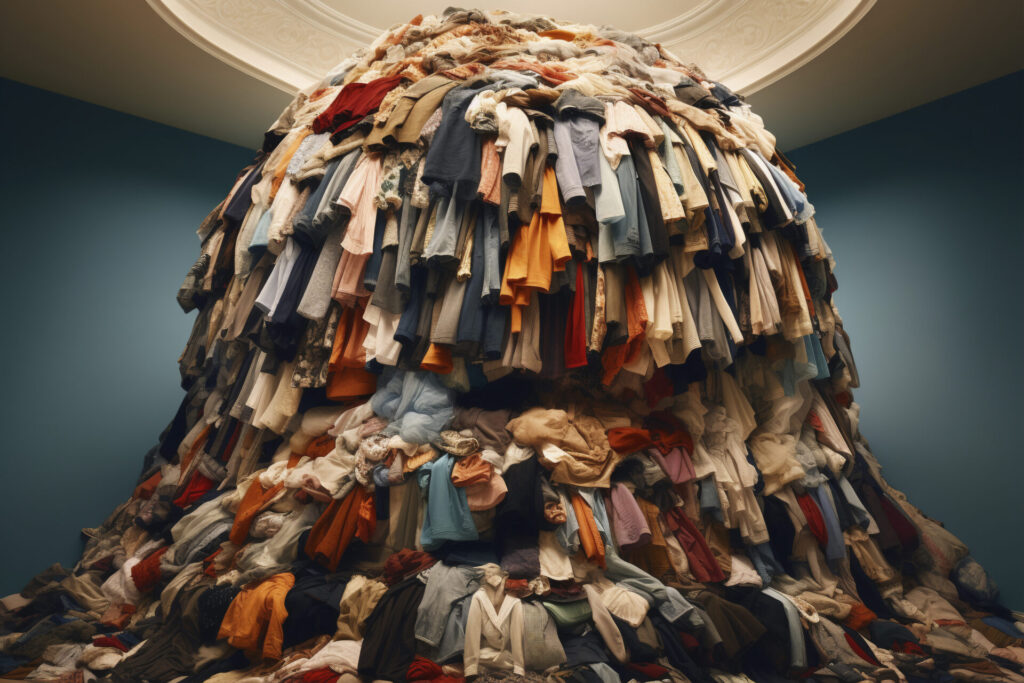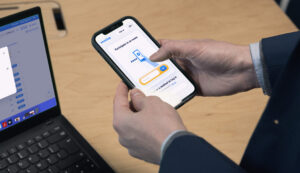
In September, Oxfam, a global NGO focusing on the alleviation of global poverty, has teamed up with Vinted, the Lithuanian online marketplace for buying, selling, and exchanging new or secondhand items for a fashion show at London Fashion Week as part of the Second Hand September campaign.
Since 2019, this initiative has encouraged sustainable shopping by promoting the use of pre-loved clothing. This season, the “Style for Change” runway show on September 12 featured celebrities modeling second-hand outfits, all styled by renowned stylist Bay Garnett.
Vinted supported the event by making the outfits available on its platform and helping boost awareness within its global community about the impact of buying second-hand fashion items.
But Vinted wasn’t the only marketplace that used the catwalk to promote its commitment to greener wardrobes. eBay, one of the world’s largest marketplaces, also collaborated with the Council of Fashion Designers of America and the British Fashion Council to bring “The Endless Runway” to London Fashion Week’s 40th anniversary and New York Fashion Week.
The collection featured pre-loved luxury items from brands like Alexander McQueen and Vivienne Westwood. They also integrated shopping directly from the runway, allowing viewers to instantly purchase the showcased items via the eBay app.
A recent ThredUp report estimated the global second-hand fashion market will reach 350 Billion USD by 2028 largely driven by younger consumers’ affinity for more environmentally conscious brands. The report states that nearly half of GenZ consumers will refuse to buy from brands which do not have a public commitment to sustainability.
But while giants like eBay and Vinted may already have the budget and brand authority to partner with the world’s leading fashion events, we took a look at some of the emerging players in the circular economy vertical, which are throwing their hats into the reused materials ring.
Here are 5 startups to keep an eye on that are also innovating in this space.
Faircado (Germany)
Faircado is a second-hand shopping platform with an AI-driven browser plugin, which provides personalized recommendations to help users find the best second-hand deals.
Faircado supports a change towards a circular economy, making sustainable choices more accessible by simplifying the search process and reducing costs. The platform aims to save users time, money, and CO2 emissions when searching for electronic goods, books, clothing, and apparel.
According to TechCrunch, the plug-in harnesses AI image and text matching to push pre-owned alternatives when users search for a product on 1,600 sites, including Amazon, Zalando, Patagonia, and Apple.
These recommendations are sourced from upwards of 50 partners including eBay, Back Market, Grailed, Rebuy, and Vestiaire Collective.
The Berlin-based startup recently raised 3 Million USD led by World Fund. Accel, General Catalyst, Lightspeed Venture Partners, NEA, Northzone and BackBone Ventures.
BelongApp (Portugal)
BelongApp is an AI-assisted multitool designed to help consumers sell pre-owned items online more easily and enjoyably.
Founded by Ekaterina Shcherbatenko, a Russian founder based in Lisbon, Portugal, the startup aims to help consumers leap into the world of re-selling, by making the process of uploading their items as painless and streamlined as possible.
Whether it’s because an extra income during a tough economy might be attractive, or the tower of bulging bags of winter jackets is finally threatening to tumble over, many people would like to get involved in the circle economy but don’t know where to start.
After all, with multiple platforms available, buying and selling for the first time can be overwhelming. With just a few photos, BelongApp enables users to identify the item, suggest the selling price and the right platform placement, create a listing, and cross-post items across multiple platforms.
And with re-sale marketplaces growing 15X faster than the broader retail clothing sector in 2023 this community of ‘newbies’ who want to get involved, but need a bit of hand-holding to get their first items online could turn into a huge market.
BelongApp is still in the Beta stage, but interested pre-users can join the waiting list here.
KiDSiE (UK)
KiDSiE is a British startup that has developed a circular platform for children and baby gear, toys, and products.
In an email exchange founder and CEO Jennifer Mathisen clarified that while clothing is not the main focus of the platform, the company’s mission is to encourage the adoption of eco-friendly circular practices and influence consumer behaviors towards circularity and more sustainable practices.
Instead of offering a peer-to-peer exchange platform, KiDSie has partnered with leading brands to provide users with incredible discounts of up to 80% on products that are in nearly perfect condition, but which otherwise would have ended up in a landfill such as items that had been returned with open boxes, ex-display items, or clearance items can be re-sold.
In a recent study, the National Retail Federation reported that 14.5% of all retail sales, or $743 billion in merchandise, were returned in 2023. For e-commerce, return rates were even worse ranging from 20-30%.
Considering most returned goods, or ex-display items are normally wasted or sold to employees for pennies in ‘store sales’ there is a huge market for these products being able to re-enter the circular market.
Tings (Norway)
Tings is a mobile app designed to assist users in organizing, retaining, and selling recyclable and used items they no longer need. The platform connects users to an ecosystem of circular services such as repair shops, secondhand marketplaces, and the brands’ aftermarket offerings.
Tings is on a mission to make repairing and taking care of existing items as convenient as buying new products. The Oslo-based startup already has some household name Nordic brands on its partner network including Fjällräven and IKEA and has amassed more than 17,000 users since its launch in 2022.
EU regulators are increasingly place fast fashion brands in the crosshairs for selling products which are not manufactured to stand the tests of time, and rolling out directives promoting repairs and second-hand markets, which puts startups like Tings in good stead for the future.
Earlier this year, the startup raised €1.2 million in a round led by Schibsted Ventures, in collaboration with Spintop Ventures, FJ Labs, Arkwright X, and others.
Cloov (Italy)
Cloov is an Italian startup which streamlines the process of rolling out rental and second-hand purchase options for their consumers for designer fashion brands.
Cloov creates white labelled rental and re-sale platforms for brands and also allows them to add repair & care services on their websites, allowing customers to request repairs directly from their own account or app. The platform also adds a layer of data visibility for brands allowing them to track their circular strategy performance in real time.
Outside of just providing the infrastructure, the team at Cloov also offers hands-on support to partner brands helping with tasks such as order preparation and furfillment, updating records and CRMs, offering customer service, and dealing with billing and payments with end clients.
The Milan-based team are not afraid to get their hands dirty either in their mission to drive more sustainable practices. When facilitating rental services for clients, the team handle the quality control of returned items, and takes charge of any cleaning or repairs needed on the items to extend their life cycle.
Cloov has already made partnerships with a number of brands including Atelier Emé, a brand part of Calzedonia group, Rinascimento, Simonetta, and others.
In April 2024, the EU Parliament rolled out the “right to repair” directive. The new rules oblige European manufacturers to provide timely and cost-effective repair services and inform consumers about their rights to repair. As part of the new directive, products which are repaired under a purchase warranty will have an additional one-year extension of the legal guarantee, further incentivizing consumers to choose repair instead of replacement.
This is great news for startups looking to follow in the footsteps of European success stories like Vinted. And good news for the rest of the planet too. After all, a recent analysis from Oxfam, released as part of their Secondhand September campaign, also revealed that purchasing just one pair of jeans and a T-shirt secondhand can save the equivalent of 20,000 standard bottles of water which would normally be used in the manufacturing process.









